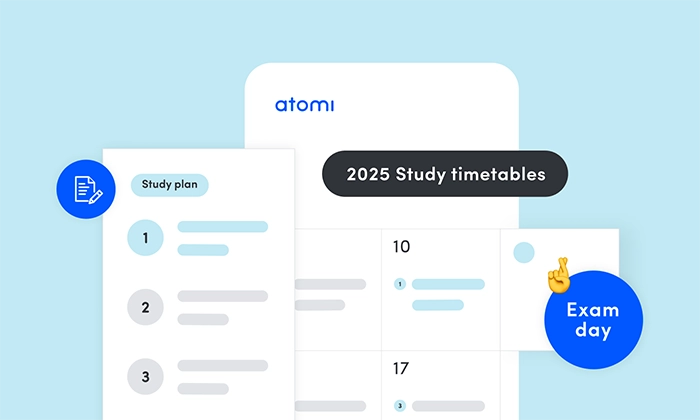Making sure your notes are exam ready

Final exams are coming up soon... 🥵 But before we start revising, it’s really important that our notes are in tip-top condition. You’ve been adding to them for almost a year, so all we need to do now is make sure they’re exam ready!
Here’s a quick checklist for ensuring your notes are ready for revision.
1. Make sure you’ve ticked off the syllabus dot points
This has to be the most important tip on our list… make sure you have every dot point listed in the syllabus covered in your notes. Remember, the syllabus contains all of the content from the course, and the questions you’ll be asked in your exam are coming straight from this document.
The more you can think about the content in terms of the syllabus dot points, the better position you’ll be in throughout your exams. Structuring your notes around this document will make it a lot easier to memorise the content, too.
So, go through the syllabus for each subject and make sure you’ve covered each dot point in your notes. If there are any gaps, go back and fill them in 📝
2. Work on condensing your notes
When it comes to studying for exams, we don’t want to be reading paragraph after paragraph of content. The most useful notes are summaries of the content, so we need to work on condensing them!
Once you’ve written the notes for a topic, pick out the most crucial bits of information and arrange all the content into a really punchy, memorable and useful summary that will actually get you through an exam.
When you’re making these summaries, always ask yourself "What will I be using this information for?", "How would I answer a question on this topic?" or "How would I use this information to answer a question?". This way, you’ll be left with the content that you need for the exam 💪
3. Make sure they make sense to you
Writing notes doesn’t mean rewriting the textbook. To make your notes useful, it’s important that you can actually understand them!
So, read over your notes from start to finish and highlight any concepts that don’t make sense to you. Rework these sections, so when it comes to revising you actually know what’s going on.

4. Revisit past exams or assessments
Sometimes, a concept or topic might require a bit more information. Revisit any past exams or assessments and look for any topics that you didn’t do so well in. This can help us to highlight any areas in our notes that are lacking or need further explanation. From here, you can add additional notes or comments that will really help you in the exam room.
Tip
There’s no point in shying away from the difficult stuff… you won’t be able to hide from it in the exam! Face your fears and get on top of it now. If you need a bit of help, reach out to your teacher 🧑🏫
5. Include exam tips
One of the most challenging parts of final exams is that they cover all of the content you’ve studied over the year, which is a lot 🥵 Any tips or tricks for remembering content or application rules will go a long way.
So, if you have a trick to help memorise a lengthy quote, add it to your notes. If you always forget to give your graphs a title, add a reminder to your notes. Have a mnemonic device (a small acronym or jingle) for remembering the syllabus dot points? You guessed it, add it to your notes!
Remember, it’s not just about remembering the content, we want to be able to apply it too, so make sure your notes are going to help you with that process!
Remember
Keep checking in to the Student Blog for more exam tips and tricks! You can also find us on Instagram or follow us on TikTok. See you there 👋
References
Subscribe to our newsletter
Get the latest teaching and learning insights delivered to your inbox.
You can unsubscribe at any time, no hard feelings.
Subscribe to our newsletter
Get the latest teaching and learning insights delivered to your inbox.
You can unsubscribe at any time, no hard feelings.
What's Atomi?
Easy to understand, super engaging, and matching what you’re learning in class. Available for 100s of subjects across your high school years.
With heaps of questions and smart AI feedback that shows you what you’ve nailed and what to work on—so you won’t just feel ready, you’ll be ready.
Improve your study game, get AI-driven tips tailored to you, keep tabs on your progress and unlock insights so you can always hit your goals.
What's Atomi?
Captivating and impactful video-first content, fit for all types of learners and grounded in the absolute must-have info of the high school curriculum.
Active recall quizzes, topic tests and exam practice enable students to get immediate feedback and build skills, while allowing teachers to differentiate instruction.
Create engaging learning experiences with easy-to-use tasks, get actionable insights to differentiate instruction and experience intelligent personalisation for your students.
What's Atomi?
Short, curriculum-specific videos and interactive content that’s easy to understand and backed by the latest research.
Active recall quizzes and practice sessions enable students to build their skills, put knowledge into practice and get feedback.
Our AI understands each student's progress and makes intelligent recommendations based on their strengths and weaknesses.




